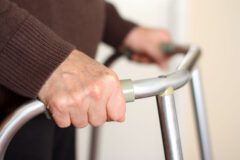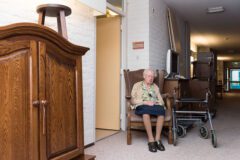5 Common Types of Nursing Home Abuse

If you have a loved one in a nursing home or need to consider this option, the tragic stories of nursing home abuse can make it an anxiety-inducing decision. When you hear statistics like 5 million elders suffer from nursing home abuse each year, it might cause you to question your choice.
Your parent, grandparent, and every elderly adult should receive only the best care from nursing home establishments. The promises of safety that nursing homes offer should be guaranteed, but are too often not provided. The good news is that nursing home abuse is preventable, and knowing the common types of abuse can help stop it.
Here are the 5 most common types of nursing home abuse:
1. Assault
By paying for a loved one to live in a nursing home, you depend on them being cared for by a loving staff. It is a horrible thing to discover cases of psychological and physical assault occur at the hands of the very team that should be helping its elderly patients.
It can be difficult to spot signs of physical abuse, but here are some to look out for:
- Unaccountable injuries such as bruising or cuts
- Unaccountable soft tissue injuries
- Devices that are broken, like glasses and hearing aids
- Marks on wrists that suggest the use of restraints
- Residents that fear their caregivers
- If a caregiver refuses to allow you to see a family member without them present
If you begin to see one or more of these signs, call 911 immediately. After reporting the abuse, get the help of a lawyer who handles nursing home abuse cases and can ensure action is taken in defense of your loved one.
2. Patient Elopement
Many times, what leads to the decision for a family member to be placed in a nursing home is the onset of dementia or other memory issues which require someone to supervise them 24/7. Patients with these issues are far more likely to wander off when they are confused—which is commonly called elopement. A good nursing home will always keep its patients well supervised, but without it, elopement can occur.
Nursing home staff are required to have the proper training required to know how to prevent residents from wandering. Fall injury prevention and other protocols should be in place to keep a senior resident from leaving the nursing home without the staff’s knowledge. Unfortunately, even with these requirements, 10% of all nursing home abuse lawsuits are because of patient elopement.
3. Bed Sores
Negligence resulting from improper medical care is sadly all too common in nursing homes, and this includes bed sores.
1 out of 10 nursing home residents suffers from bedsores, according to the CDC. They are typically caused by unrelieved pressure on the skin and can result in life-threatening injuries.
In other words, sitting or lying in one place without movement can cause bed sores.
Nursing homes should provide daily exercise and frequent skin inspections to their residents and not allow them to stay seated in one position for too long.
When bed sores occur, hospitals generally measure them on a four-stage scale to determine their severity. Bedsores must be diagnosed early. If not healed properly, they can lead to serious issues like:
- Sepsis
- Bone or Joint infections
- Cellulitis
- Cancer
4. Slip & Fall Injuries
It is common knowledge that senior adults are far more likely to fall and seriously hurt themselves. Everything from fractures, breaks, head trauma, and other serious injuries can result from a fall when staff does not properly supervise their residents. Many elderly residents require constant and adequate supervision to prevent slipping or falling. If a nursing home does not have prevention protocols that all staff follow, you should not consider it a safe place for your loved one.
Final Thoughts
Any nursing home whose negligence has caused harm to your loved one should be held responsible. Getting the help of an attorney with experience in this field can provide real accountability and fair compensation for the trauma that has devastated your family member’s life.






